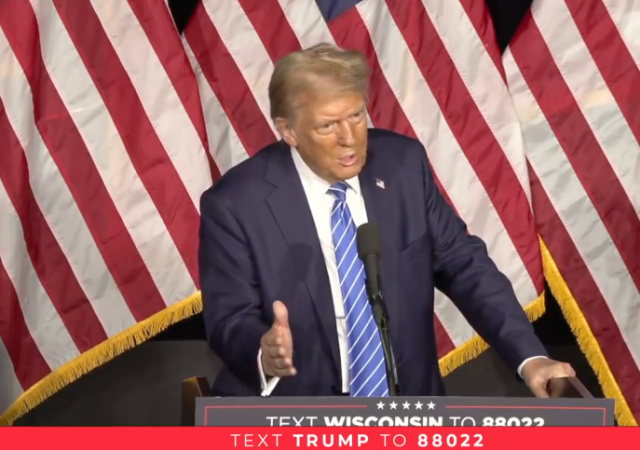Trump to Fight Biden Admin’s Work-from-Home Protections for Federal Employees

The Biden administration has been working feverishly to “Trump-proof” the federal government before they hand over power on January 20.
Knowing that one of President-elect Donald Trump’s immediate priorities is to bring federal employees – many of whom have been working remotely since the early days of the pandemic – back into the office, Social Security Administration Commissioner Martin O’Malley signed an agreement two weeks ago with the American Federation of Government Employees, a union representing 42,000 federal workers, to “lock in work-from-home protections” until 2029.
Bloomberg reported this story.
During Trump’s wide-ranging Monday press conference at Mar-a-Lago, he told reporters he plans to fight this deal in the courts.
Trump said, “We’re talking about a friendly takeover, a friendly transition as they like to say, this is a friendly transition, and it is. But there are two events that took place that I think are very terrible.”
He continued, “One is that if people don’t come back to work, come back into the office, they’re going to be dismissed, and somebody in the Biden administration gave a five-year waiver of that. So that for five years, people don’t have to come back into the office. It involved 49,000 people. For five years, they don’t have to go. They just signed this thing. It’s ridiculous. So it was like a gift to a union, and we’re going to obviously be in court to stop it.”
AFGE National President Everett Kelley issued a statement in response to Trump’s remarks, arguing that telework and remote work have actually “helped the federal government increase productivity and efficiency, maintain continuity of operations, and increase disaster preparedness.” While that claim sounds a bit suspect, Kelley’s claim that remote work arrangements help government agencies recruit and retain top talent may be correct.
Kelley also downplayed the allegation that many federal employees are working remotely. He wrote, “More than half of federal employees cannot telework at all because of the nature of their jobs, only ten percent of federal workers are remote, and those who have a hybrid arrangement spend over sixty percent of working hours in the office.”
Finally and most importantly, he said, “Collective bargaining agreements entered into by the federal government are binding and enforceable under the law. We trust the incoming administration will abide by their obligations to honor lawful union contracts. If they fail to do so, we will be prepared to enforce our rights.”
It remains very unclear whether the Trump administration will be able to reverse this deal. It appears destined to be resolved by the courts who will have to consider the following questions.
During a transition period, does a federal official from the outgoing administration have the right to enter into a contract that will tie the hands of the incoming president for his entire four-year term and even the next president for the first year of his term?
(It should be noted that O’Malley resigned from his position just days after signing this agreement, as per Bloomberg. He’s no longer even part of the Biden administration.)
Even if it’s determined that O’Malley lacked the authority to do so, where does that leave the union, whose lawyers will argue had signed the agreement in good faith?
Elon Musk and Vivek Ramaswamy, who will lead the Department of Government Efficiency (DOGE), consider the elimination or reduction of remote work for federal workers as a way to cut wasteful government spending. Last month, the pair published an op-ed in The Wall Street Journal, in which they claimed, “Requiring federal employees to come to the office five days a week would result in a wave of voluntary terminations that we welcome: If federal employees don’t want to show up, American taxpayers shouldn’t pay them for the COVID-era privilege of staying home.”
Fox Business Network reported that following the announcement of the agreement between the SSA and AFGE, Sen. Joni Ernst, (R-IA), the leader of the Senate’s DOGE caucus, called it “unacceptable” and said she intends to work with Musk and Ramaswamy to “fix this ASAP and get bureaucrats back to work.”
Unfortunately for the Trump administration, this agreement is only one of many obstacles the Biden administration has put in place to obstruct their agenda.
Elizabeth writes commentary for The Washington Examiner. She is an academy fellow at The Heritage Foundation and a member of the Editorial Board at The Sixteenth Council, a London think tank. Please follow Elizabeth on X or LinkedIn.
CLICK HERE FOR FULL VERSION OF THIS STORY